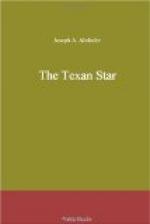They rode until nearly noon, when they stopped in a fine grove of oaks and pecans by the side of a clear creek. The grass was also rich and deep here, and they did not take the trouble to tether their horses. Ned was exceedingly glad to dismount as he was stiff and sore from the long ride, and he was also as hungry as a wolf.
“Lay down on the grass, Ned, an’ stretch yourself,” said Karnes. “When you’re tired the best way to rest is to be just as lazy as you can be. The ground will hold you up an’ let your lungs do their own breathin’. Don’t you go to workin’ ’em yourself.”
Ned thought it good advice and took it. It was certainly a great luxury to make no physical exertion and just to let the ground hold him up, as Karnes had said. Obed imitated his example, stretching himself out to his great thin length on the soft turf.
“Two are company and twenty are more so,” he said, “especially if you’re in a wild country. My burden of care isn’t a quarter as heavy since we met Jim Bowie, and all the rest of these sure friends and sure shots. This isn’t much like San Juan de Ulua is it, Ned? You wouldn’t like to be back there.”
The boy looked up at the vast blue dome of the heavens, then he listened a moment to the sigh of the free wind which came unchecked a thousand miles and he replied with so much emphasis that his words snapped:
“Not for worlds, Obed!”
Obed White laughed and rolled over in the grass.
“I do believe you mean that, Ned,” he said, “and the sentiments that you speak so well are also mine own.”
Smith and Karnes went a little distance up the creek, and found some buffalo feeding. They shot a young cow, and in an incredibly short space tender steaks were broiling over a fire. After dinner all but two went to sleep. They understood well the old maxim that the more haste the less speed, and that the sleep and rest through the hours of the afternoon would make them fit for the long riding that was yet before them.
At five o’clock they were in the saddle again, and rode until midnight. The next morning the party separated. The men were to carry the blazing torch throughout the settlements, telling all the Texans that the Mexicans were coming and that they were bringing war with them. But Bowie, “Deaf” Smith and Karnes kept on with Ned and Obed.
“We’re taking you to Sam Houston,” said Bowie to Ned. “He’s to be the general of all the Texan forces, we think, and we want you to tell him what you’ve told us.”
They began now to see signs of settlements in the river bottoms where the forests grew. There were stray little log cabins, almost hidden among the oaks and pecans. Women and children came forth to see the riders go by. The women were tanned like the men, and often they, too, were clothed in buckskin. The children, bare of foot and head, seemed half wild, but all, despite the sun, had the features of the Northern races.




